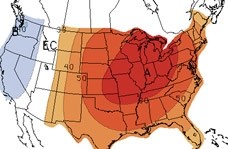|
The
Lauren, A Condominium - Special


Cherry Blossoms Early
March 24-31, 2012
Washington
Post
03/01/12
Rob DeFeo, chief horticulturalist at the
National Park Service, predicts an early peak for this year’s
Centennial cherry blossom bloom at the Tidal Basin.
DeFeo, speaking at a press
conference at the Newseum this morning, said he expects peak
bloom to occur between March 24 and 31. The average bloom date
is around April 1. Peak bloom is defined as the day on which 70
percent of the blossoms are open.
Related: D.C.
cherry blossoms’ peak expected March 24-31, during 100th
birthday bash
DeFeo explained the bloom periods starts a few
days before the peak bloom date and can last up to 10 days
after, although there is some year-to-year variability.
Unseasonably warm weather for much of the
winter has led to “a lot of speculation”about the bloom
date, DeFeo said. But the 3rd
warmest December to February period on record in Washington,
D.C. has little bearing on the bloom dates, he said
“It really only matters as to what happens
from now on,” he said. “All the warm weather before did not
move the cherries along. But now, yes. Now is the time where, if
it gets really, really warm, things could accelerate.”
As David Streit reported
yesterday, the earliest blossom peak on record occurred on
March 17, 2000. That year, temperatures were 5 degrees above
average in March. No freezing temperatures occurred before the
peak bloom (during March) and temperatures surged to between 70
and 85 degrees for four straight days March 7-10.

NOAA’s 30-day outlook for March
indicates a good chance of above average temperatures for much
of the eastern two thirds of the U.S. (NOAA CPC) Forecasts
for the month of March this year indicate above
average temperatures in the region. For the next week,
temperatures should be at least five degrees above normal. But
there is no clear sign that it will become “really, really
warm” with a temperature spike into the 80s in the near term.
Related: March
outlook: Warmer than average, low snow chances
Beyond the next week, NOAA’s 6
to 10 and 8
to 14 day outlooks also indicate warmer than average weather
in D.C.
“We’ll be monitoring the buds and
providing [bloom date prediction] updates as appropriate,”
DeFeo said.
Related: National
Park Service Bloom Watch website
|